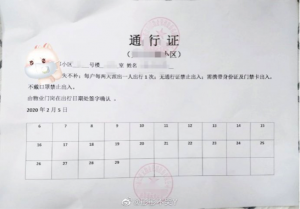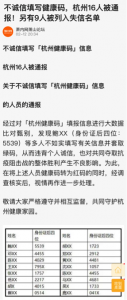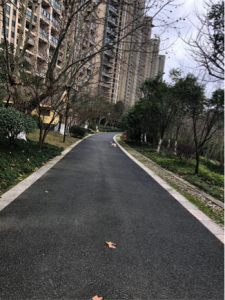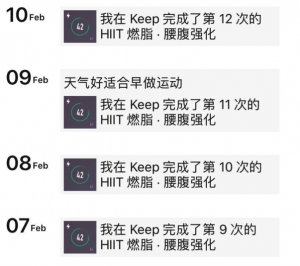By: Koh Hui Xin
Sent from Xiaoshan District, Hangzhou, Zhejiang Province
It rarely snows in Hangzhou, but today is one of those days. Shuyi sighs and picks up three large reusable grocery bags from the kitchen and the car keys. “I absolutely hate it when it snows,” she tells me. “It is true when Chinese people say that winter in the Jiangnan region is colder than in Beijing. They are not lying. But I’d give anything to be able to go out right now.”
Yao Shuyi is a resident of Xiaoshan district in Hangzhou, capital city of Zhejiang Province in Eastern China. Hangzhou is known for its picturesque scenery along the West Lake and is home to Chinese tech giant Alibaba. Xiaoshan houses Hangzhou’s main airport, Hangzhou Xiaoshan International Airport, and the newly opened Hangzhou South railway station. Since February 4, Hangzhou has been under lockdown to limit the spread of the novel coronavirus – COVID-19 which first emerged in Wuhan, a city almost 600km away.
Shuyi explains to me that a lockdown in Hangzhou means nobody is allowed to go out of their homes without permission. In Xiaoshan, the district government has imposed a rule that all residential compounds must keep only one entrance open. One person in each household is allowed to leave the compound once every two days and must have their government-issued ticket stamped upon leaving and entering.


Government-issued ticket for leaving and entering one’s residential compound —— via TongtongbukuY on Weibo.
Since February 11, Hangzhou’s new “Health QR Code”, a mini-programme on Alipay, has replaced the government-issued tickets. Users fill out an online form reporting their identification number, recent travel history, and any symptoms they might have that suggest an illness, such as fever or a heavy cough. They then receive a colour-based QR code to indicate their health status. Users with a red code must remain quarantined for 14 days and provide regular check-ins via DingTalk, a workplace chat app also run by Alibaba. Users with a yellow code are instructed to stay in their homes for seven days, while users with a green code can travel freely. Most places, such as supermarkets, restaurants, and residential compounds, and all public transport now require users to display their QR codes before they enter. This mini-programme was implemented throughout Zhejiang province on February 16 and is expected to be rolled out nationwide soon.


I ask Shuyi if residents falsify their information to avoid quarantine. She responds by sending me a news article on WeChat that lists Hangzhou residents who have been caught doing so.


While there is no restriction on where residents can go, most do not go anywhere else other than the supermarket. Wet markets have been forcibly closed and most restaurants either only provide delivery services or have stopped operating completely. Shuyi and her mother takes turns to go to the supermarket every two days to buy fresh produce and other necessities for the household. “It is tough to stay at home every day, but I support the city government’s decision to lock down the city. Hangzhou is a big city and currently has one of the highest infection rates in China. It is the only way to contain the virus and ensure everyone’s safety.”
Outside, small groups of policemen and volunteers patrol the streets. They hold megaphones with pre-recorded voices that tell people to “wear masks, avoid gatherings, and exercise social responsibility”. In the usually bustling capital city of 10 million, the streets are deserted, save for the occasional car that passes by and stray dogs scouring for food in empty bins.


An employee checks Shuyi’s temperature and her “Health QR Code” app at the entrance of the supermarket. A sign states in Chinese and English that people without masks are not allowed to enter, but that is hardly a problem. Most are decked out in their homemade protective gears, such as raincoats, ski goggles, shower caps, and rubber gloves, to ensure full body coverage. The supermarket is well stocked and fresh produce are aplenty. Shoppers calmly pick out their items and are mindful to keep a distance between each other.
At home, Shuyi takes a picture of her groceries and sends it on a WeChat group with her friends from university, asking them for suggestions on what she should cook for lunch. Shuyi is currently a fourth-year student at Fudan University located in Shanghai. While she stays in a student dormitory on campus for the most part of the year, she goes back to Hangzhou every winter break to spend Chinese New Year with her family. This year is no exception, when she had planned last year to leave Shanghai on January 10 and return on February 23, a day before school was slated to start. “But we are not allowed to go back to school now. I was excited because this is my last semester before I graduate from university, but because of the coronavirus school is postponed until further notice. It is the same for most universities in China. We will have lessons online until school starts. For high schools in China, their semesters have already started and they are all taking lessons online now,” she explains.
I ask her if the postponed university semester will affect plans for graduating students. “We will probably have make-up lessons on weekends when school starts. I hope the semester will not end too late. I will be going for graduate school in China after this, so it’s fine for me, but I hope it will not affect my friends who will be pursuing further studies overseas. The semesters might clash, and it would be a waste of time if they have to wait another year.”


On a typical day at home, Shuyi wakes up at 8:30 a.m. to have her breakfast. She goes online at 9 a.m. to begin work as an intern at an investment management firm. At noon, she exercises before having her lunch. Opening a social fitness app called “Keep”, she chooses the type of workout she wants to do for the day – high-intensity interval training (HIIT), the muscle group that she wants to work on – her waist and abs, and follows its series of workout demonstration videos. “I’ve been working on my abs recently due to long hours of sitting. This app is amazing because it offers all kinds of workouts and also works as a sort-of-personal trainer, as you can personalise your workout according to your needs. This is one of the best fitness apps in China – maybe in the world. You should try it,” she advises me.
“I use this app because it not only serves as a fitness app, but also a social app. On here, I can interact with my friends and the fitness community. We keep each other’s fitness in check and motivate each other. Especially during this period when most of us are stuck at home, the social aspect of this app has really motivated me to be disciplined in my fitness routine.”
After her workout, her post sharing her routine completion pops up on my WeChat moments. I give it a like.


Today, Shuyi is also on duty as a volunteer to deliver food to her neighbour, a family from Wenzhou. She explains that as they had just come back from Wenzhou, which has the highest infection rate of any city outside Hubei province, they are quarantined indefinitely and are not allowed to go out of their homes. Shuyi signed up as a volunteer with her residential compound when the outbreak started and has been tasked to collect this family’s food delivery order at the residential compound’s entrance to bring to their home.
“Before the outbreak, the food deliverymen would come up to each of our houses. Now, to minimise contact, they are only allowed to put it at the designated collection point, and residents will go down to pick it up. Even during this short distance, we have to wear masks and are strongly discouraged to interact with neighbours we see on the way. I chose to volunteer with my residential compound because I want to help the compound and my neighbours in this time of difficulty. I am young and probably have better immunity, so I should do more. My main duty now involves food delivery to the family from Wenzhou who live above me. I’d leave the food outside their door, and they can only come out to collect the food once I am away. Some of my other duties include taking people’s temperatures at the compound’s entrance and blocking non-residents from entering the compound.”
After ending work at 6pm, Shuyi winds down at night by playing games on her handphone. The notifications on her phone ping non-stop with messages from an app called “Jubensha”, which roughly implies “scripts of murder”. It is an online, multiplayer, role-playing game where users act as detectives and interact with each other to solve crime cases with given scenarios and clues. Cases are fictional and vary in difficulty – they can take up to four hours to be solved. Detective games like Jubensha have become extremely popular in China in recent years as they test one’s logical reasoning skills and provide a platform for socialising.
“I play this game with my friends and strangers on the app. I prefer games like these as I can train my critical thinking skills while having fun at the same time. No two cases are the same – there are hundreds and thousands of stories available. Sometimes, your character is the murderer and you don’t even know it. I’ve also made quite a few online friends from playing this game. After finishing a case, we would sometimes stay on the app to chat. We not only chat about the case, but sometimes discuss current affairs, trade celebrity gossips, and even share about our personal lives.”
While Shuyi’s mother works from home with her, her father is only home every second day. As Deputy Director of the Hangzhou South Station Police Station – just a few minutes’ drive away from their home – he works in shifts of 24 hours. His duties now extend beyond that of his usual policing job to also include security and basic medical jobs. Hangzhou is a megacity that relies heavily on migrant workers. Many migrant workers travelled back to their hometowns before the Chinese New Year holidays, but most are now unable to return to work in the cities. The drastic labour shortage in Hangzhou has resulted in law enforcement officers having to work overtime and beyond their job scope to make up for the lack in numbers. “Many law enforcement officers and health care workers have also volunteered to go to Wuhan to serve in the frontline, where they need them more,” she explains.
For the past few days, her father was busy assisting in preparations for the nation’s first chartered train that arrived at Hangzhou East Railway Station on February 16. According to China Railway Chengdu Group Co. Ltd, Hangzhou had applied to the railway department for a specially chartered train for migrant workers from places where the epidemic situation is relatively stable to return to work. The planned service brought about 300 migrant workers from Southwest China’s Guizhou province – where many migrant workers in Hangzhou are from – directly to Hangzhou. Special measures were taken in place to avoid cross-infection and curb the spread of the virus, such as providing an exclusive waiting area for the migrant workers and seating them at a safe distance apart on the train. More of such direct chartered trains are planned in the coming weeks to help migrant workers in the Southwestern region return to the megacities of Beijing, Shanghai, and Guangzhou.
To cap off this interview, I ask Shuyi what she wants to do most after the epidemic. “I just want to go out and eat, eat, and eat. I will eat Thai cuisine and barbequed meat first as I am unable to make these at home and I crave them so much. I also want to put in more effort in finding a boyfriend after the epidemic ends, but eating delicious food is more important right now,” she laughs. /TISG

